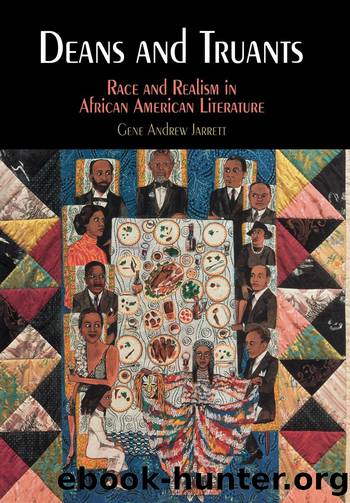Deans and Truants by Jarrett Gene Andrew;

Author:Jarrett, Gene Andrew;
Language: eng
Format: epub
Publisher: University of Pennsylvania Press
Chapter 6
âThe Race Problem Was Not a Theme for Meâ
Richard Wright and Frank Yerby thrived in similar social, geographic, and intellectual circles. Born in the same month but seven years apart, both came from the American South, Yerby from Augusta, Georgia, and Wright from Roxie, Mississippi.1 During the Great Depression, poverty forced Yerby to drop out of a doctoral program in English at the University of Chicago, where Wright happened to obtain and read sociological literature during his formative stage as a writer. Toward the latter part of the 1930s, Yerby participated in a Chicago-based New Deal program and probably rubbed elbows with Wright, Margaret Walker, William Attaway, and Arna Bontemps, all affiliated with the Chicago Renaissance. Like Wright, James Baldwin, Chester Himes, and William Gardner Smith, all expatriates in the 1950s, Yerby moved, in 1951, to Paris. In five years, he relocated to Madrid, where he lived until his death on November 29, 1991.
The earliest highlight of both of their literary careers, furthermore, was the O. Henry Award, which Wright won in 1939 for âFire and Cloudâ and Yerby in 1945 for âHealth Card.â Yerbyâs story critiques the ideology and practices of racism in the United States in ways Wright, a decade later, found provocative. For Wright, âHealth Cardâ relates âa variation of the same theme, a man subjected to a sort of psychological castration, as it were, directly in front of his wifeâs eyes . . . This Negro, being further from his roots, weeps tears of innocent rage.â2 Despite the similarities between his work and Wrightâs, beginning in the mid-1940s, Yerby tried to rid himself of the expectations and responsibilities that came with writing both as a black man and in the wake of Wrightâs success.
In a letter written to Michel Fabre, who was working on a biography of Wright, Yerby clarifies the extent of his dissociation: âI knew Dick Wright none too well. I admired him immensely as a man. I visited him in Paris circa 1953 or 4. I donât remember which. I was not at all influenced by him as a writer, except perhaps negatively. ... I liked, admired, enjoyed his earlier books; but if they influenced me at all, it was to confirm my growing suspicion that the race problem was not a theme for me.â3 Certain correspondence and literary works (poems, short stories, novels, and criticism) Yerby wrote between 1933 and 1956 could explain that last line, âthe race problem was not a theme for me.â He was referring to the ârace problemâ as constructed by the genre of New Negro radicalism in African American literature, led by Wright.
Yerbyâs aversion to this genre, as articulated in his letter to Fabre, did not exist throughout his career. Nor was it the sole reason for his production of thirty novels between 1946 and 1986, with nonblack protagonists and eclectic historical settings, cultural geographies, and political themes. Early in his career, during the early 1930s, Yerby was a poet ambivalent in his employment of outdated
Download
This site does not store any files on its server. We only index and link to content provided by other sites. Please contact the content providers to delete copyright contents if any and email us, we'll remove relevant links or contents immediately.
4 3 2 1: A Novel by Paul Auster(11788)
The handmaid's tale by Margaret Atwood(7447)
Giovanni's Room by James Baldwin(6808)
Asking the Right Questions: A Guide to Critical Thinking by M. Neil Browne & Stuart M. Keeley(5355)
Big Magic: Creative Living Beyond Fear by Elizabeth Gilbert(5351)
Ego Is the Enemy by Ryan Holiday(4956)
On Writing A Memoir of the Craft by Stephen King(4662)
The Body: A Guide for Occupants by Bill Bryson(4582)
Ken Follett - World without end by Ken Follett(4443)
Bluets by Maggie Nelson(4261)
Adulting by Kelly Williams Brown(4232)
Eat That Frog! by Brian Tracy(4149)
Guilty Pleasures by Laurell K Hamilton(4116)
White Noise - A Novel by Don DeLillo(3829)
The Poetry of Pablo Neruda by Pablo Neruda(3814)
Fingerprints of the Gods by Graham Hancock(3738)
Alive: The Story of the Andes Survivors by Piers Paul Read(3730)
The Book of Joy by Dalai Lama(3697)
The Bookshop by Penelope Fitzgerald(3619)
